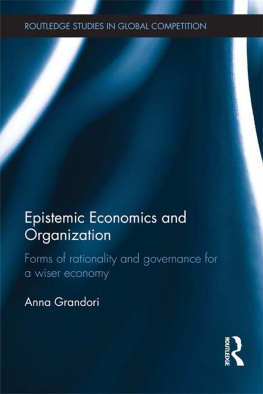Epistemic Economics and Organization
This book proposes a new approach to economics, management and organization that should help in making economic organization wise, innovative and robust in an uncertain and risky world. Although the modern economy and society is knowledge intensive, Anna Grandori argues that the dominant economic, organizational and behavioural models neglect to a large extent the problem of valid knowledge construction and effective knowledge governance.
The book integrates inputs from economics and behavioural science with insights from the philosophy of knowledge to define new micro-foundations: neither a calculative, deductive and omniscient rational actor; nor an experiential, adaptive and biased behavioural actor; but a knowledgeable and imaginative epistemic actor.
The implications for contracts and organizations, sustained also by insights from law, are shown to be far reaching, including a new view of the nature of the firm as an entity-establishing agreement under which to discover uses of resources under uncertainty, and as a democratic institution.
Anna Grandori is Professor of Business Organization at Bocconi University, Milan, Italy.
Routledge studies in global competition
Edited by
John Cantwell
Rutgers, State University of New Jersey, USA
and
David Mowery
University of California, Berkeley, USA
1 Japanese Firms in Europe
Edited by Frdrique Sachwald
2 Technological Innovation, Multinational Corporations and New International Competitiveness
The case of intermediate countries
Edited by Jos Molero
3 Global Competition and the Labour Market
Nigel Driffield
4 The Source of Capital Goods Innovation
The role of user firms in Japan and Korea
Kong-Rae Lee
5 Climates of Global Competition
Maria Bengtsson
6 Multinational Enterprises and Technological Spillovers
Tommaso Perez
7 Governance of International Strategic Alliances
Technology and transaction costs
Joanne E. Oxley
8 Strategy in Emerging Markets
Telecommunications establishments in Europe
Anders Pehrsson
9 Going Multinational
The Korean experience of direct investment
Edited by Frdrique Sachwald
10 Multinational Firms and Impacts on Employment, Trade and Technology
New perspectives for a new century
Edited by Robert E. Lipsey and
Jean-Louis Mucchielli
11 Multinational Firms
The globallocal dilemma
Edited by John H. Dunning and Jean-Louis Mucchielli
12 MIT and the Rise of Entrepreneurial Science
Henry Etzkowitz
13 Technological Resources and the Logic of Corporate Diversification
Brian Silverman
14 The Economics of Innovation, New Technologies and Structural Change
Cristiano Antonelli
15 European Union Direct Investment in China
Characteristics, challenges and perspectives
Daniel Van Den Bulcke,
Haiyan Zhang and
Maria do Cu Esteves
16 Biotechnology in Comparative Perspective
Edited by Gerhard Fuchs
17 Technological Change and Economic PerformanceAlbert L. Link and
Donald S. Siegel
18 Multinational Corporations and European Regional Systems of Innovation
John Cantwell and
Simona Iammarino
19 nowledge and Innovation inRegional Industry
An entrepreneurial coalition
Roel Rutten
20 Local Industrial Clusters
Existence, emergence and evolution
Thomas Brenner
21 The Emerging Industrial Structure of the Wider Europe
Edited by Francis McGowen,
Slavo Radosevic and
Nick Von Tunzelmann
22 Entrepreneurship
A new perspective
Thomas Grebel
23 Evaluating Public Research Institutions
The US Advanced Technology Programs Intramural Research Initiative
Albert N. Link and John T. Scott
24 Location and Competition
Edited by Steven Brakman and Harry Garretsen
25 Entrepreneurship and Dynamics in the Knowledge Economy
Edited by Charlie Karlsson,
Brje Johansson and
Roger R. Stough
26 Evolution and Design of Institutions
Edited by Christian Schubert and
Georg von Wangenheim
27 The Changing Economic Geography of Globalization
Reinventing space
Edited by Giovanna Vertova
28 Economics of the Firm
Analysis, evolution and history
Edited by Michael Dietrich
29 Innovation, Technology and Hypercompetition
Hans Gottinger
30 Mergers and Acquisitions in Asia
A global perspective
Roger Y.W. Tang and
Ali M. Metwalli
31 Competitiveness of New Industries
Institutional framework and learning in information technology in Japan, the US and Germany
Edited Cornelia Storz and
Andreas Moerke
32 Entry and Post-entry Performance of Newborn Firms
Marco Vivarelli
33 Changes in Regional Firm Founding Activities
A theoretical explanation and empirical evidence
Dirk Fornahl
34 Risk Appraisal and Venture Capital in High Technology New Ventures
Gavin C. Reid and Julia A. Smith
35 Competing for Knowledge
Creating, connecting and growing
Robert Huggins and Hiro Izushi
36 Corporate Governance, Finance and the Technological Advantage of Nations
Andrew Tylecote and
Francesca Visintin
37 Dynamic Capabilities between Firm Organisation and Local Systems of Production
Edited by Riccardo Leoncini and
Sandro Montresor
38 Localised Technological Change
Towards the economics of complexity
Cristiano Antonelli
39 Knowledge Economies
Innovation, organization and location
Wilfred Dolfsma
40 Governance and Innovation
Maria Brouwer
41 Public Policy for Regional Development
Edited by Jorge Martinez-Vazquez and Franois Vaillancourt
42 Evolutionary Economic Geography
Location of production and the European Union
Miroslav Jovanovic
43 Broadband Economics
Lessons from Japan
Takanori Ida
44 Targeting Regional Economic Development
Edited by Stephan J. Goetz,
Steven C. Deller and
Thomas R. Harris
45 Innovation, Knowledge and Power in Organizations
Theodora Asimakou
46 Creativity, Innovation and the Cultural Economy
Edited by Andy C. Pratt and
Paul Jeffcutt
47 Coopetition Strategy
Giovanni Battista Dagnino and
Elena Rocco
48 Knowledge Intensive Entrepreneurship and Innovation Systems
Evidence from Europe
Edited by Franco Malerba
49 Innovation in Complex Social Systems
Edited by Petra Ahrweiler
50 Internationalization, Technological Change and the Theory of the Firm
Edited by Nicola De Liso and
Riccardo Leoncini
51 Territory, Specialization and Globalization in European Manufacturing













